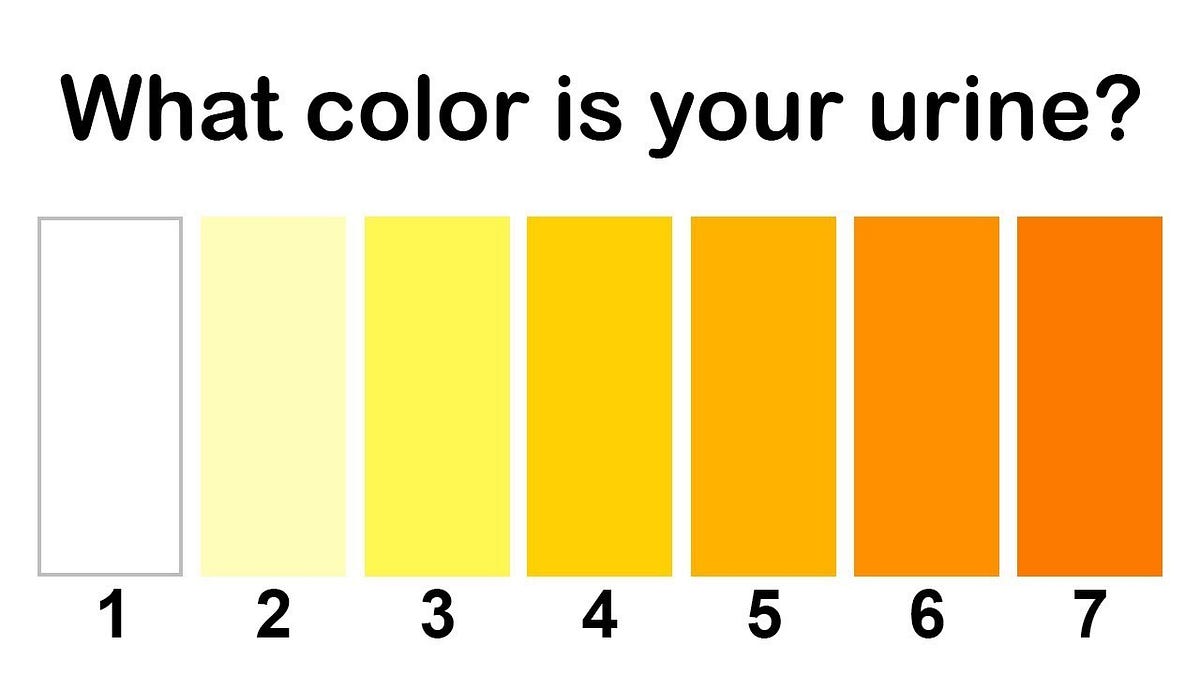Bright yellow pee can be an alarming sight for many, often prompting questions about hydration, diet, and overall health. This phenomenon, while it can be harmless in some contexts, can also indicate underlying health issues that need attention. In this article, we will explore the various reasons why urine may appear bright yellow, the implications of this color change, and what you can do to address it.
The color of urine can be influenced by a variety of factors, including hydration levels, the foods you consume, and even certain medications. Understanding these factors is crucial for interpreting what your body is trying to communicate through this bodily function. Let's delve into the science behind urine color, the significance of bright yellow pee, and when it might be time to consult a healthcare professional.
Whether you’re experiencing bright yellow urine for the first time or it’s a recurring issue, this comprehensive guide aims to provide clarity and actionable insights. By the end of this article, you will have a clearer understanding of your urinary health and how to maintain it.
Table of Contents
- What is Bright Yellow Pee?
- The Science Behind Urine Color
- Common Causes of Bright Yellow Pee
- Hydration and Urine Color
- Dietary Factors Affecting Urine Color
- Medications and Supplements
- When to See a Doctor
- Conclusion
What is Bright Yellow Pee?
Bright yellow pee refers to urine that appears vividly yellow in color. This can be attributed to several factors, primarily the concentration of urochrome, a pigment that is produced during the breakdown of hemoglobin in the body. The more concentrated your urine is, the darker and more intense its color will be. Bright yellow urine can sometimes be mistaken for an indication of dehydration; however, it can also be caused by dietary choices or supplements.
Understanding Urine Composition
Urine is primarily composed of water, but it also contains a variety of waste products, including urea, creatinine, and uric acid. The concentration of these substances can influence the color of your urine:
- Urochrome: This is the pigment responsible for the yellow color of urine. Higher levels of urochrome can lead to a more intense yellow hue.
- Water Content: Well-hydrated individuals will typically have pale yellow urine, while dehydrated individuals may experience darker shades.
The Science Behind Urine Color
The color of urine can serve as a vital indicator of your body’s hydration status and overall health. Factors affecting urine color include:
- Hydration Levels: Adequate water intake leads to lighter urine, while dehydration results in darker urine.
- Diet: Certain foods and beverages can alter urine color, such as beets, berries, and food dyes.
- Medications: Some medications can cause urine to turn bright yellow or even orange.
Common Causes of Bright Yellow Pee
Several factors can lead to bright yellow urine, including:
1. Dehydration
When the body is dehydrated, urine becomes more concentrated, leading to a darker yellow color. Ensuring adequate fluid intake is crucial in maintaining optimal hydration levels.
2. Vitamin B2 Intake
Riboflavin, or Vitamin B2, is known to give urine a bright yellow color. High doses of this vitamin from supplements can lead to noticeably brighter urine.
3. Diet
Consuming foods that are rich in pigments, such as carrots and beets, can also result in changes in urine color. Foods with strong colors can affect urine hue significantly.
Hydration and Urine Color
Staying properly hydrated is essential for maintaining healthy urine color. Here’s how hydration affects urine:
- Pale Yellow Urine: Indicates good hydration.
- Bright Yellow Urine: May indicate mild dehydration or high intake of certain vitamins.
- Dark Yellow Urine: Typically indicates significant dehydration and a need for increased fluid intake.
Dietary Factors Affecting Urine Color
Your diet plays a significant role in urine color. Foods that can cause bright yellow urine include:
- Carrots
- Beets
- Certain berries
- Food coloring agents
In addition, high-protein diets may also lead to changes in urine color due to the increased metabolic waste products being excreted.
Medications and Supplements
Certain medications and supplements can alter urine color:
- Vitamin B Complex: Often responsible for bright yellow urine, especially riboflavin.
- Antibiotics: Some antibiotics can darken urine or cause changes in color.
- Phenazopyridine: A medication used for urinary tract pain can turn urine bright orange or red.
When to See a Doctor
While bright yellow urine is often harmless, there are certain circumstances when you should consult a healthcare professional:
- If bright yellow urine is accompanied by other symptoms, such as pain or burning during urination.
- If urine color does not return to normal with increased hydration.
- Persistent changes in urine color without an obvious cause.
Conclusion
Bright yellow pee can result from a variety of factors, ranging from dietary choices to hydration levels. Understanding the implications of urine color is essential for maintaining good health. If you experience persistent changes in urine color or other concerning symptoms, it’s always best to consult with a healthcare professional for further evaluation. Remember, staying hydrated and maintaining a balanced diet are key components to ensuring your urinary health.
We invite you to share your thoughts or experiences in the comments below! If you found this article helpful, please consider sharing it with others or exploring more of our health-related articles.
Thank you for reading, and we hope to see you back for more informative content!
You Might Also Like
Understanding High Porosity Hair: Causes, Care, And Tips For Healthy LocksIs Cereal A Soup? Unraveling The Great Breakfast Debate
Understanding Lebanese Women: Culture, Strength, And Identity
Ultimate Guide To Chick-fil-A Sauce Recipe: How To Make It At Home
Kangaskhan: The Mighty Pokémon Of The Kanto Region
Article Recommendations
- Efficient Strategies_0.xml
- Water Softener Overflowing Brine Tank
- 76 Out Of 80
- Exterior Joint Compound
- Healthy Habits_0.xml
- Cost To Extend Garage
- Balanced Lifestyle_0.xml
- Deacon Johnson
- Streaming Device Whose Name Means Six
- Clr Soak Overnight


